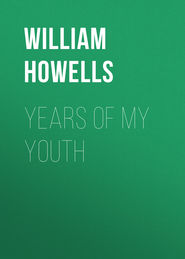По всем вопросам обращайтесь на: info@litportal.ru
(©) 2003-2024.
✖
A Counterfeit Presentment; and, The Parlour Car
Автор
Год написания книги
2017
Настройки чтения
Размер шрифта
Высота строк
Поля
Bartlett.– "Oh, very likely! So is King David his name, when he happens to be in a Scriptural craze. What explanation have you been commissioned to make me? What apology?"
Cummings.– "The most definite, the most satisfactory. You resemble in a most extraordinary manner a man who has inflicted an abominable wrong upon these people, a treacherous and cowardly villain" —
Bartlett, in a burst of fury. – "Stop! Is that your idea of an apology, an explanation? Isn't it enough that I should be threatened, and vilified, and have people fainting at the sight of me, but I must be told by way of reparation that it all happens because I look like a rascal?"
Cummings.– "My dear friend! Do listen to me!"
Bartlett.– "No, sir, I won't listen to you! I've listened too much! What right, I should like to know, have they to find this resemblance in me? And do they suppose that I'm going to be placated by being told that they treat me like a rogue because I look like one? It is a little too much. A man calls 'Stop thief' after me and expects me to be delighted when he tells me I look like a thief! The reparation is an additional insult. I don't choose to know that they fancy this infamous resemblance in me. Their pretending it is an outrage; and your reporting it to me is an offence. Will you tell them what I say? Will you tell this General Wyatt and the rest of his Bedlam-broke-loose, that they may all go to the" —
Cummings.– "For shame, for shame! You outrage a terrible sorrow! You insult a trouble sore to death! You trample upon, an anguish that should be sacred to your tears!"
Bartlett, resting his elbow on the corner of the piano. – "What – what do you mean, Cummings?"
Cummings.– "What do I mean? What you are not worthy to know! I mean that these people, against whom you vent your stupid rage, are worthy of angelic pity. I mean that by some disastrous mischance you resemble to the life, in tone, manner, and feature, the wretch who won that poor girl's heart, and then crushed it; who – Bartlett, look here! These are the people – this is the young lady – of whom my friend wrote me from Paris: do you understand?"
Bartlett, in a dull bewilderment. – "No, I don't understand."
Cummings.– "Why, you know what we were talking of just before they came in: you know what I told you of that cruel business."
Bartlett.– "Well?"
Cummings.– "Well, this is the young lady" —
Bartlett, dauntedly. – "Oh, come now! You don't expect me to believe that! It isn't a stage-play."
Cummings.– "Indeed, indeed, I tell you the miserable truth."
Bartlett.– "Do you mean to say that this is the young girl who was jilted in that way? Who – Do you mean – Do you intend to tell me – Do you suppose – Cummings" —
Cummings.– "Yes, yes, yes!"
Bartlett.– "Why, man, she's in Paris, according to your own showing!"
Cummings.– "She was in Paris three weeks ago. They have just brought her home, to help her hide her suffering, as if it were her shame, from all who know it. They are in this house by chance, but they are here. I mean what I say. You must believe it, shocking and wild as it is."
Bartlett, after a prolonged silence in which he seems trying to realise the fact. – "If you were a man capable of such a ghastly joke – but that's impossible." He is silent again, as before. "And I – What did you say about me? That I look like a man who" – He stops and stares into Cummings's face without speaking, as if he were trying to puzzle the mystery out; then, with fallen head, he muses in a voice of devout and reverent tenderness: "That – that – broken – lily! Oh!" With a sudden start he flings his burden upon the closed piano, whose hidden strings hum with the blow, and advances upon Cummings: "And you can tell it? Shame on you! It ought to be known to no one upon earth! And you – you show that gentle creature's death-wound to teach something like human reason to a surly dog like me? Oh, it's monstrous! I wasn't worth it. Better have let me go, where I would, how I would. What did it matter what I thought or said? And I – I look like that devil, do I? I have his voice, his face, his movement? Cummings, you've over-avenged yourself."
Cummings.– "Don't take it that way, Bartlett. It is hideous. But I didn't make it so, nor you. It's a fatality, it's a hateful chance. But you see now, don't you, Bartlett, how the sight of you must affect them, and how anxious her father must be to avoid you? He most humbly asked your forgiveness, and he hardly knew how to ask that you would not let her see you again. But I told him there could be no question with you; that of course you would prevent it, and at once. I know it's a great sacrifice to expect you to go" —
Bartlett.– "Go? What are you talking about?" He breaks again from the daze into which he had relapsed. "If there's a hole on the face of the earth where I can hide myself from them, I want to find it. What do you think I'm made of? Go? I ought to be shot away out of a mortar; I ought to be struck away by lightning! Oh, I can't excuse you, Cummings! The indelicacy, the brutality of telling me that! No, no, – I can't overlook it." He shakes his head and walks away from his friend; then he returns, and bends on him a look of curious inquiry. "Am I really such a ruffian" – he speaks very gently, almost meekly, now – "that you didn't believe anything short of that would bring me to my senses? Who told you this of her?"
Cummings.– "Her father."
Bartlett.– "Oh, that's too loathsome! Had the man no soul, no mercy? Did he think me such a consummate beast that nothing less would drive me away? Yes, he did! Yes, I made him think so! Oh!" He hangs his head and walks away with a shudder.
Cummings.– "I don't know that he did you that injustice; but I'm afraid I did. I was at my wits' end."
Bartlett, very humbly. – "Oh, I don't know that you were wrong."
Cummings.– "I suppose that his anxiety for her life made it comparatively easy for him to speak of the hurt to her pride. She can't be long for this world."
Bartlett.– "No, she had the dying look!" After a long pause, in which he has continued to wander aimlessly about the room: "Cummings, is it necessary that you should tell him you told me?"
Cummings.– "You know I hate concealments of any kind, Bartlett."
Bartlett.– "Oh, well; do it then!"
Cummings.– "But I don't know that we shall see him again; and even if we do, I don't see how I can tell him unless he asks. It's rather painful."
Bartlett.– "Well, take that little sin on your conscience if you can. It seems to me too ghastly that I should know what you've told me; it's indecent. Cummings," – after another pause, – "how does a man go about such a thing? How does he contrive to tell the woman whose heart he has won that he doesn't care for her, and break the faith that she would have staked her life on? Oh, I know, – women do such things, too; but it's different, by a whole world's difference. A man comes and a man goes, but a woman stays. The world is before him after that happens, and we don't think him much of a man if he can't get over it. But she, she has been sought out; she has been made to believe that her smile and her looks are heaven, poor, foolish, helpless idol! her fears have been laid, all her pretty maidenly traditions, her proud reserves overcome; she takes him into her inmost soul, – to find that his love is a lie, a lie! Imagine it! She can't do anything. She can't speak. She can't move as long as she lives. She must stay where she has been left, and look and act as if nothing had happened. Oh, good Heaven! And I, I look like a man who could do that!" After a silence: "I feel as if there were blood on me!" He goes to the piano, and gathering up his things turns about towards Cummings again: "Come, man; I'm going. It's sacrilege to stay an instant, – to exist."
Cummings.– "Don't take it in that way, Bartlett. I blame myself very much for not having spared you in what I said. I wouldn't have told you of it, if I could have supposed that an accidental resemblance of the sort would distress you so."
Bartlett, contritely. – "You had to tell me. I forced you to extreme measures. I'm quite worthy to look like him. Good Lord! I suppose I should be capable of his work." He moves towards the door with his burden, but before he reaches it General Wyatt, from the corridor, meets him with an air of confused agitation. Bartlett halts awkwardly, and some of the things slip from his hold to the floor.
VII
General Wyatt, Cummings, and Bartlett
General Wyatt.– "Sir, I am glad to see you." He pronounces the civility with a manner evidently affected by the effort to reconcile Bartlett's offensive personal appearance with his own sense of duty. "I – I was sorry to miss you before; and now I wish – Your friend" – referring with an inquiring glance to Cummings – "has explained to you the cause of our very extraordinary behaviour, and I hope you" —
Bartlett.– "Mr. Cummings has told me that I have the misfortune to resemble some one with whom you have painful associations. That is quite enough, and entirely justifies you. I am going at once, and I trust you will forgive my rudeness in absenting myself a moment ago. I have a bad temper; but I never could forgive myself if I had forced my friend" – he turns and glares warningly at Cummings, who makes a faint pantomime of conscientious protest as Bartlett proceeds – "to hear anything more than the mere fact from you. No, no," – as General Wyatt seems about to speak, – "it would be atrocious in me to seek to go behind it. I wish to know nothing more." Cummings gives signs of extreme unrest at being made a party to this tacit deception, and General Wyatt, striking his palms hopelessly together, walks to the other end of the room. Bartlett touches the fallen camp-stool with his foot. "Cummings, will you be kind enough to put that on top of this other rubbish?" He indicates his armful, and as Cummings complies, he says in a swift fierce whisper: "Her secret is mine. If you dare to hint that you've told it to me, I'll – I'll assault you in your own pulpit." Then to General Wyatt, who is returning toward him: "Good-morning, sir."
General Wyatt.– "Oh! Ah! Stop! That is, don't go! Really, sir, I don't know what to say. I must have seemed to you like a madman a moment ago, and now I've come to play the fool." Bartlett and Cummings look their surprise, and General Wyatt hurries on: "I asked your friend to beg you to go away, and now I am here to beg you to remain. It's perfectly ridiculous, sir, I know, and I can say nothing in defence of the monstrous liberties I have taken. Sir, the matter is simply this: my daughter's health is so frail that her life seems to hang by a thread, and I am powerless to do anything against her wish. It may be a culpable weakness, but I cannot help it. When I went back to her from seeing your friend, she immediately divined what my mission had been, and it had the contrary effect from what I had expected. Well, sir! Nothing would content her but that I should return and ask you to stay. She looks upon it as the sole reparation we can make you."
Bartlett, gently. – "I understand that perfectly; and may I beg you to say that in going away I thanked her with all my heart, and ventured to leave her my best wishes?" He bows as if to go.
General Wyatt, detaining him. – "Excuse me – thanks – but – but I am afraid she will not be satisfied with that. She will be satisfied with nothing less than your remaining. It is the whim of a sick child – which I must ask you to indulge. In a few days, sir, I hope we may be able to continue on our way. It would be simply unbearable pain to her to know that we had driven you away, and you must stay to show that you have forgiven the wrong we have done you."
Bartlett.– "That's nothing, less than nothing. But I was thinking – I don't care for myself in the matter – that Miss Wyatt is proposing a very unnecessary annoyance for you all. My friend can remain and assure her that I have no feeling whatever about the matter, and in the meantime I can remove – the embarrassment – of my presence."
General Wyatt.– "Sir, you are very considerate, very kind. My own judgment is in favour of your course, and yet" —
Cummings.– "I think my friend is right, and that when he is gone" —
General Wyatt.– "Well, sir! well, sir! It may be the best way. I think it is the best. We will venture upon it. Sir," – to Bartlett, – "may I have the honour of taking your hand?" Bartlett lays down his burden on the piano, and gives his hand. "Thank you, thank you! You will not regret this goodness. God bless you! May you always prosper!"
Bartlett.– "Good-bye; and say to Miss Wyatt" – At these words he pauses, arrested by an incomprehensible dismay in General Wyatt's face, and turning about he sees Cummings transfixed at the apparition of Miss Wyatt advancing directly toward himself, while her mother coming behind her exchanges signals of helplessness and despair with the General. The young girl's hair, thick and bronze, has been heaped in hasty but beautiful masses on her delicate head; as she stands with fallen eyes before Bartlett, the heavy lashes lie dark on her pale cheeks, and the blue of her eyes shows through their transparent lids. She has a fan with which she makes a weak pretence of playing, and which she puts to her lips as if to hide the low murmur that escapes from them as she raises her eyes to Bartlett's face.
VIII
Constance, Mrs. Wyatt, and the others
Constance, with a phantom-like effort at hauteur. – "I hope you have been able to forgive the annoyance we caused you, and that you won't let it drive you away." She lifts her eyes with a slow effort, and starts with a little gasp as they fall upon his face, and then remains trembling before him while he speaks.
Bartlett, reverently. – "I am to do whatever you wish. I have no annoyance – but the fear that – that" —
Constance, in a husky whisper. – "Thanks!" As she turns from him to go back to her mother, she moves so frailly that he involuntarily puts out his hand.











